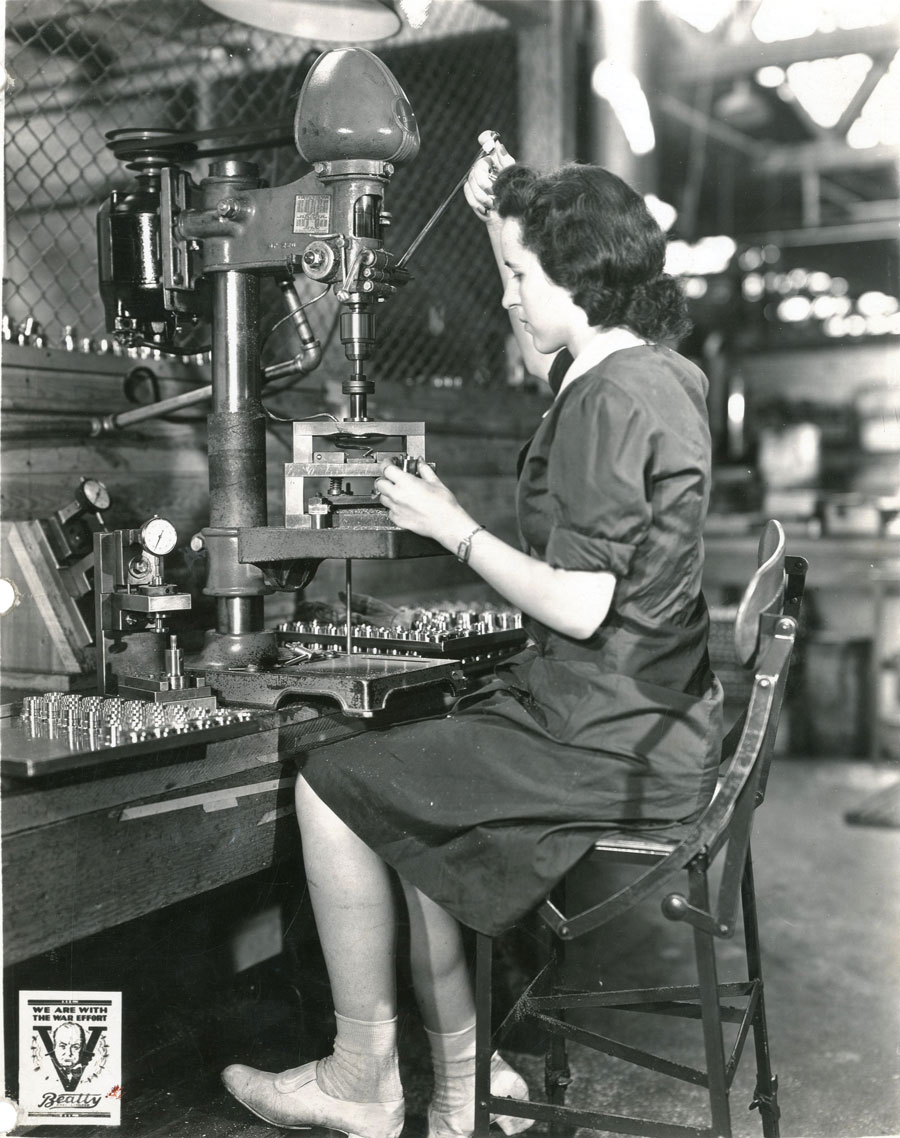FERGUS – Most people familiar with local history will know that Beatty Brothers Limited was the largest manufacturer in the area and an economic driver in the early days of the Village of Fergus.
But like other industries during the Second World War, Beatty Bros. had to pivot operations when its workforce headed to the front and metal was reserved for the war effort.
The Beattys had to move away from producing farm equipment and home appliances and instead started producing equipment for Canadian troops.
Early days
Brothers George and Matthew Beatty founded Beatty Brothers in 1874 and in 1901, George’s sons Matthew and Milton Beatty joined the company’s management.
Initially the company focused on the manufacture and repair of farm equipment and over the years expanded to become a major international manufacturer of agricultural machinery, barn and stable equipment, and household appliances.
By 1925, Beatty Brothers Ltd. was considered the largest producer and exporter of barn and stable equipment in the British Empire.
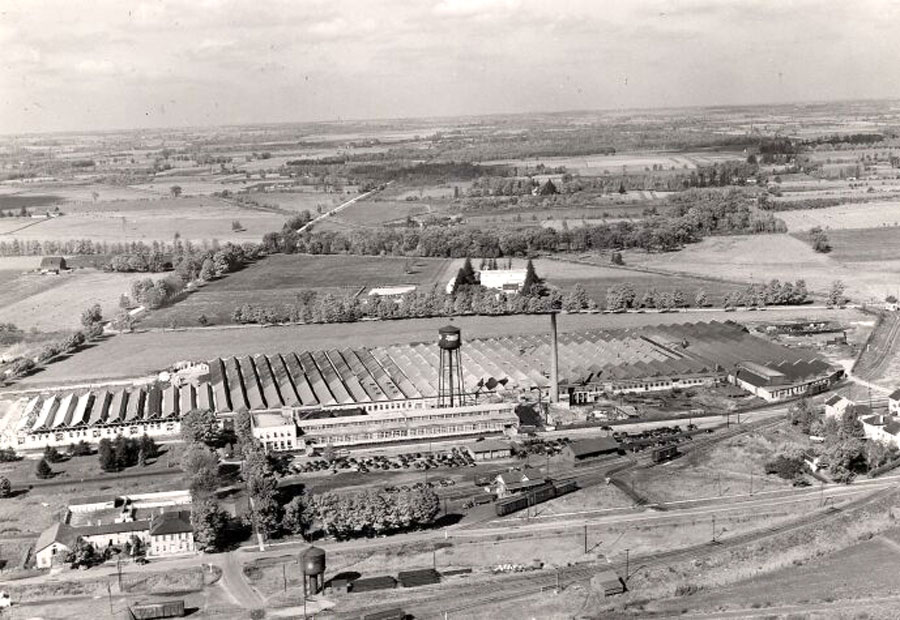
Then – This aerial view of the Beatty Brothers factory taken in 1951 shows the size of the company, with its distinct angled roofing. The demonstration farm can be seen just north of the water tower in the centre of the image.
Wellington County Museum and Archives, ph 4833
During the First World War the company received enough government contracts that it needed more employees and housing for them to live.
They formed the Fergus Housing Corporation, and through negotiations with the Village of Fergus, acquired land near the Hill Street plant and began constructing homes.
The 27 homes on Kitchener Avenue and on the north side of St. Andrew Street West between Beatty Line and Johnston Street North are the homes Beatty Brothers built for its employees, who were able to purchase the homes through weekly payroll deductions.
The six stone homes on Brock Avenue were built in 1935 to house supervisors who needed to work irregular hours.
By the time of the Second World War, Beatty Brothers Ltd. had a large factory on Hill Street, a demonstration farm just north of that on Garafraxa Street West and housing for its workers.
The company was well entrenched as the financial powerhouse in Fergus. But war forced the company to change its operations.
According to an essay written by Geoff Raymond in Wellington County History, Volume 21, 2008, “Fergus, Ontario is an excellent case study for those wishing to examine how a company town reacts to a major event like a world war.
“Unlike the situation facing the major urban centres of Toronto, Montreal and Vancouver, Fergus’ interests were directly tied to the success of Beatty Brothers Limited.”
By 1934, Beatty Brothers employed 2,000 people at the Hill Street plant, which was roughly one-third of the population of Fergus.
Indeed, they had operations across Canada and even in London, England, and customers from all over the world, including Australia and Japan.
War forced change
When WWII broke out, the federal government instituted restrictions on metals for manufacturers.
“By 1941, the production of washing machines … was restricted to 75 per cent and by 1942 it was further reduced to 60% of average 1940 production,” states the essay.
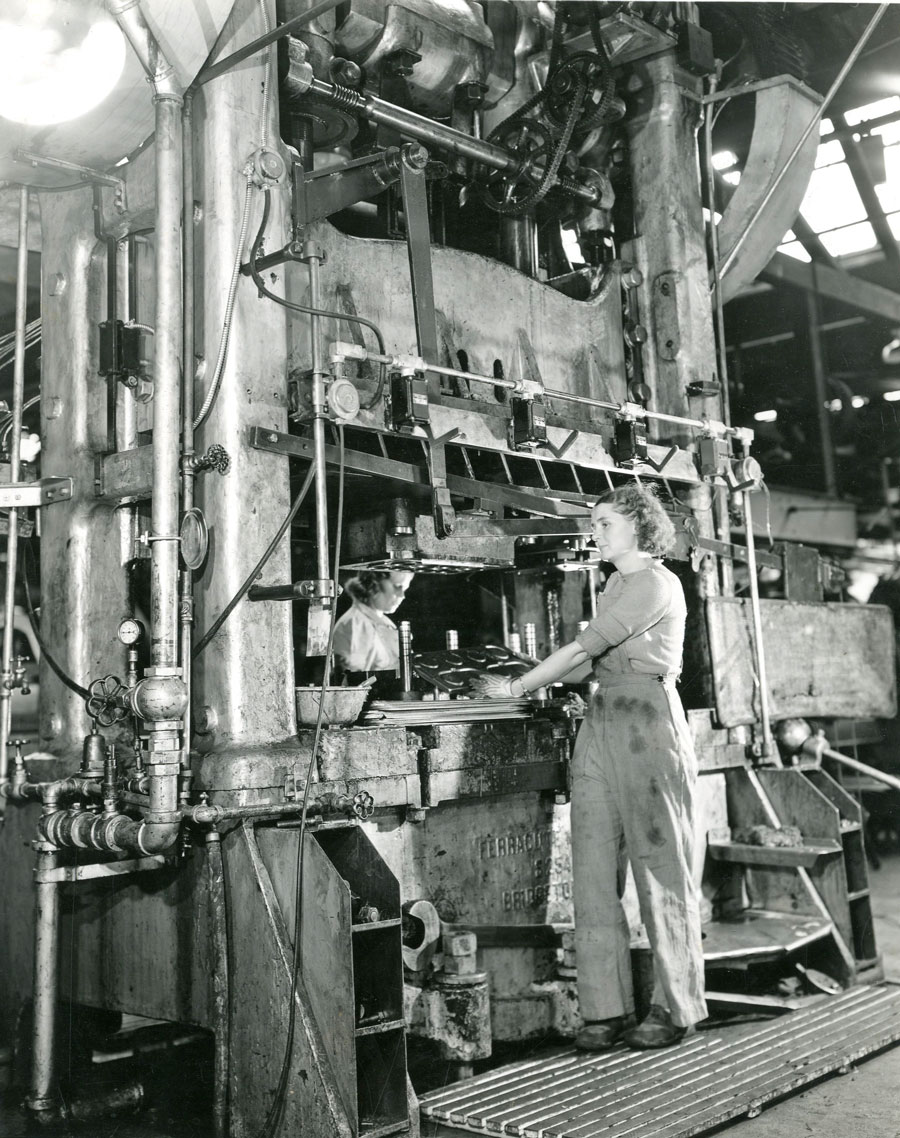
War effort – These women, working at Beatty Brothers Ltd., are pressing out parts for shell boxes for the munitions department in 1941. Photo WCMA 24829
Household appliances had become the bread and butter of Beatty Brothers and these restrictions were affecting the business.
The company decided to pursue munitions contracts. It could repurpose its equipment to that end and by 1942, the company’s war work was about 80% of its total production.
Beatty Brothers won contracts to make a variety of items for the war effort, from folding tables to munitions.
They made primers – the part of a shell that explodes the firing charge – shell boxes, and in 1941 they won a naval contract worth $10 million.
Top secret contract
Documents from this era are scarce, Raymond wrote, and the contracts would have been quite secretive given the war, but it is assumed Beatty Brothers started making rocket guns, which were used on ships to protect against air attacks.
Parts of the gun were made in the Hill Street factory in the open, but the end product was not obvious.
Raymond writes: “The final assembly took place in a well-guarded portion of the factory and was securely crated before leaving town by truck or railway car. The Hill Street plant produced 2,300 of these secret weapons, valued at approximately $1,300 each.”
War was profitable for the company, but the owners constantly worried how they would adapt once the war ended.
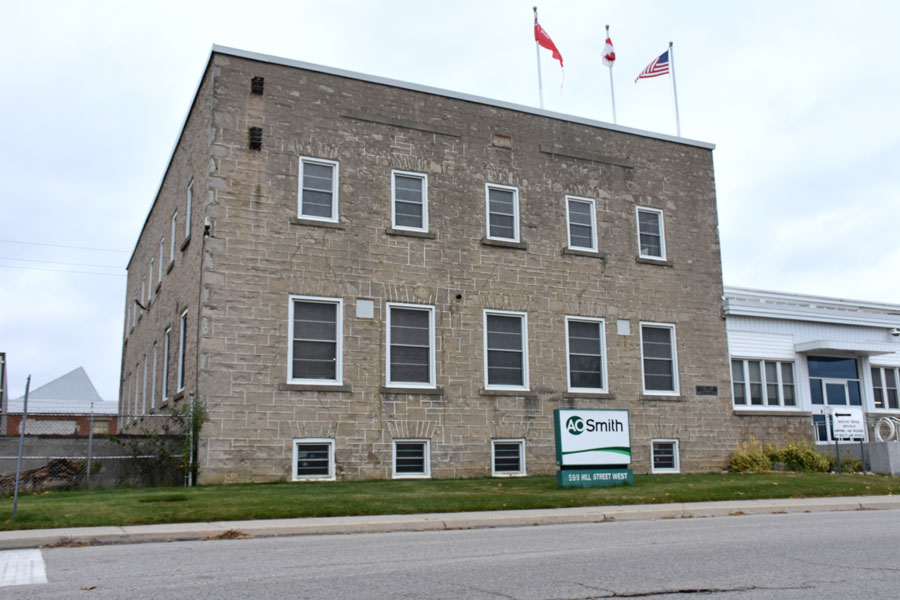
The main building of Beatty Brothers Ltd. on Hill Street in Fergus, now home to A.O. Smith, is still standing and is part of a cultural heritage landscape identified by Centre Wellington Township. Beatty Brothers was instrumental in the growth of Fergus before and during the Second World War. Photo by Joanne Shuttleworth
“Unlike previous boom periods, war conditions meant that the engineering and maintenance departments were heavily employed on war material products,” Raymond wrote.
“This not only meant that the development of new products was minimal, but that only one or two per cent of the value of their efforts found its way into the balance sheet surplus.”
By December of 1942 the company was forced to close its retail outlets as there were no washing machines or farm equipment being made and therefore none to sell.
International trade was also impacted by war. Britain prohibited the import of household appliances and it was devastating to the business to lose an important trade partner.
The company also had to find employees when 20% of its workforce left to serve in the war.
Beatty Brothers started hiring women – about 250 of them by 1941 – who made primers, conducted quality control inspections and operated big machines.
But it wouldn’t last – not for the female employees, and not for the company either.
End of war marks beginning of the end
With the end of the war came the end of government contracts. The company returned to manufacturing household appliances but had lost its brand recognition and, some argue, its sense of innovation.
“The outbreak of World War II was a positive and profitable experience for Beatty Brothers during the war itself. Postwar, Beatty Brothers, however, suffered because of wartime government restrictions,” Raymond wrote.
In 1938 the farm property on Garafraxa Street, which Beatty Brothers used as a demonstration farm to highlight its farm equipment, was sold to Fergus Fur Farms.
In 1964 Beatty Bros. Ltd sold its production facilities, including the Hill Street factory to General Steel Wares Ltd. (GSW) of Toronto.
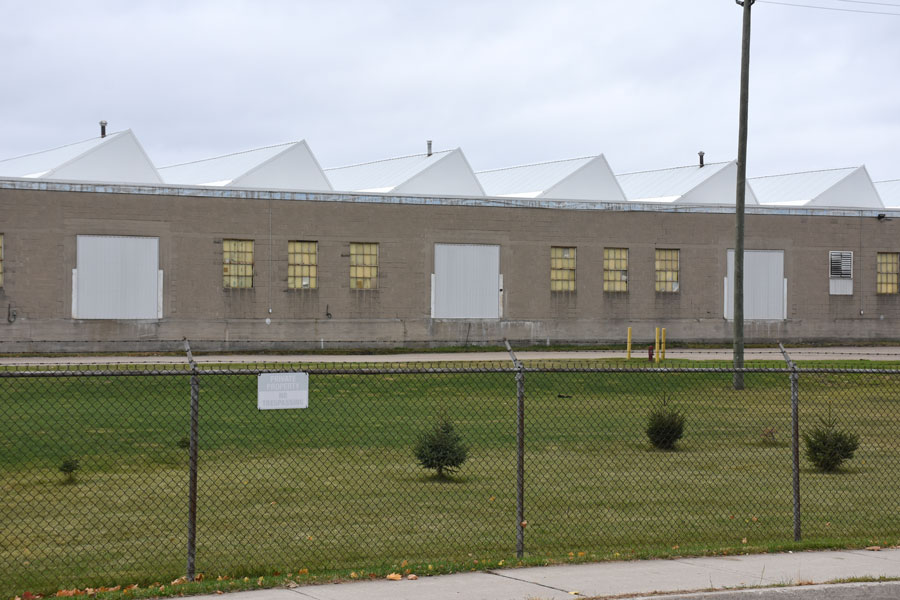
And now – The distinctive angled roof remains at the former site of Beatty Brothers Ltd. on Hill Street in Fergus. A.O. Smith, which is celebrating its 150th anniversary this year, now inhabits the building. Photo by Joanne Shuttleworth
In 2006 GSW was purchased by A.O. Smith, a manufacturer of hot water heaters. In 2013, A.O. Smith announced that manufacturing at the Hill Street plant would cease, and the facility would be used only as a distribution and administrative centre.
A.O. Smith is still located on Hill Street and this year the company celebrates its 150th anniversary, although not 150 years at the Fergus site.
The Beatty Brothers factory and surrounding residences are one of the cultural heritage landscapes identified by Centre Wellington Township, largely because the site is relatively intact and because the company itself played a large role in the identity of Fergus.
While the story of the company is not only a war story, the Second World War certainly shaped the company and, by extension, the future of Fergus.




